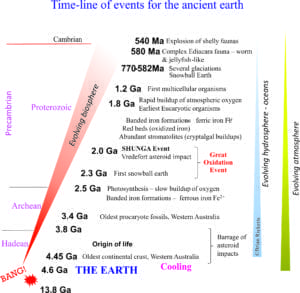A time-line for the first 4 billion years of Earth history
The Cambrian, that relatively brief period in geological history (40 odd million years) was witness to one of the most amazing series of biological events in the entire history of the Earth; the rapid, almost explosive appearance of marine critters with preservable shells and skeletons – a real first. Trilobites are probably the best known fossils from that period, but there are also some pretty weird and wonderful looking soft-bodied creatures (one famous fossil locality is the Burgess Shale near the town of Field, British Columbia). Most animal life today can track its origin to those early life forms. These events began about 540 million years ago (how easy these numbers roll off the tongue, or pen). But we also know that our Earth is pretty close to 4600 million years old (4.6 billion – How old is Earth); in other words there is almost 4 billion years, a humongous period of time in which, seemingly, not much happened. 4000 million years worth of boredom! This period is know as the “Pre” Cambrian, or Precambrian. Most Precambrian events did take place pretty slowly, but these events also determined the kind of world we now live in: the air we breath, the oceans and rivers, the biosphere and indeed life itself, all originated and evolved over this, the deepest of geological time. Continue reading


